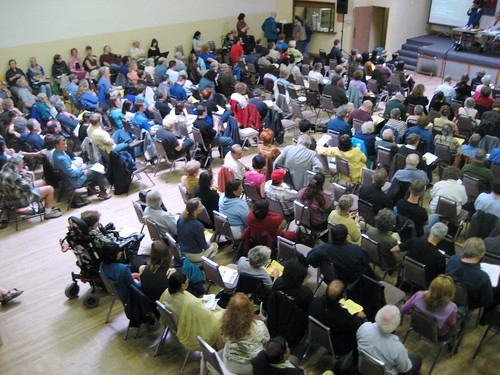Today was quite a day in the world of partisan Vancouver civic politics. The civic Green Party held a special general meeting at noon to discuss electoral cooperation with COPE and Vision Vancouver. Meanwhile, COPE also held a special general meeting at 3pm to debate and potentially ratify an agreement with Vision, proposing the following slate:
City Council: Vision 7 / COPE 3
Parks Board: Vision 5 / COPE 2 – (plus one position offered to civic Greens)
School Board: Vision 5 / COPE 4
Interestingly, the civic Green Party membership voted to reject the Vision-COPE offer of one seat on Parks Board. The Greens voted instead to work with COPE alone, should the COPE membership reject Vision’s terms later in the afternoon. The Greens also voted to reject any cooperation with Vision, and to hold their nomination meeting in mid-August 2011.
COPE’s special general meeting, with about 200 members in attendance, began with a member from the floor trying to get a motion on the agenda to negotiate with the Greens instead of Vision, but was defeated in a close vote.
The highly polarized membership then heard arguments for and against the proposed deal with Vision. Those against argued that the last three years have proven that Vision City Councilors do not vote progressively, that they won’t caucus with COPE, that they continue core NPA policies, and that COPE needs to distinguish itself more clearly from Vision in order to win and make real change. Those in favour of Vision’s offer argued that COPE and Vision share more commonalities than differences, that the NPA is much worse than Vision, and that it is desirable to avoid vote-splitting with Vision. The coalition vote passed, with more than one third present voting against.



